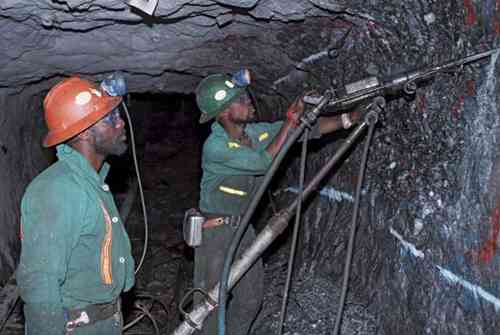
The Shona saying goes, chikomo chinoremera vari kure , vari pedo vanotamba nacho .
I will not explain what this means, l will just talk about the reasoning and why it is now a thing of the past.
The norm was, the locals knew their area, they knew the roads, they had access to, they spent time exploring , unlike the outsiders.
The locals bore the benefits of the hills and mountains, they prayed in them, they buried their dead in their caves, they got fruits, firewood etc.
This is now just folklore.
The locals are no longer allowed in the mountains because there is lithium, there is gold , there is black granite there.
The locals will be arrested for trespassing, worse still illegal prospecting if they are found in the mountains.
The locals watch as the mountains disappear right before their eyes. Chikomo chave kuremera vari pedo, vekure vari kuchidya.
- Miss Royalty Zimbabwe seeks collaborations
- Miss Royalty Zimbabwe seeks collaborations
- Developer Kingsley earning his stripes
- Developer Kingsley earning his stripes
Keep Reading
One of the major sources of revenue in Zimbabwe is the mining sector.
The country has over 40 minerals which include gold, diamonds, platinum, chrome, asbestos, coal and iron ore.
Mining operations date back to the colonial era.
One of the major reasons for colonialism was the dream of a land of gold across the Limpopo River.
Although this dream was never realised, soon numerous mines emerged throughout the country.
The extractive sector has for decades been known for tax injustice, environmental injustices, violence and human rights violations.
Governments are failing to protect citizens from corporate and environmental violations.
UN Women forecasts that in sub-Saharan Africa, the number of women and girls living in extremely poor households is expected to increase from 249 million to 283 million between 2021 and 2030.
In this context, what remains indisputable is that multinational companies will continue to externalise profits while internalising environmental costs.
Women continue to be systematically left out of decisions and benefits surrounding mining due to their societal positionalities.
The just energy transition presents a unique opportunity to shift these archaic and violent gender relations.
For women and girls, their demands and voices should be centred in shaping Africa’s energy transition, as they bear the brunt of economic and political decision making.
Recently, in Kadoma there was found to be mercury. According to the study carried out by Dennis Shoko, a local academic, and other researchers from outside Zimbabwe, titled “Country Diagnostic Report on Environmental Health Implications of Mercury in Artisanal and Small-Scale Gold Mining in Zimbabwe” women miners living and working in areas where mercury is used are exposed to danger.
The mercury, which is used to process gold, exposes women and their children to lifelong diseases such as brain damage, kidney failure and heart diseases.
The study sought to measure infants’ and mothers’ levels of mercury in urine, hair and breast milk in the gold-rich area of Chakari, Kadoma.
It involved 120 mothers whose breast milk samples were analysed from four different groups.
Part of the study reads: High levels of mercury were found in breast milk in the Kadoma/Chakari area, which unduly exposes breastfeeding infants.
A large number of children of school-going age and women of childbearing age are already intoxicated or have elevated levels of mercury in their bodies.
The problem with the current laws on mining in Zimbabwe.
The current law in Zimbabwe does not address the farmer-miner conflict.
The current law does not provide for artisanal mining, yet they contribute considerably to the industry.
The Act does not provide for the local beneficiation of natural resources.
It does not provide for the rehabilitation of the environment.
The communities which host these mining companies do not even have a say neither are they consulted.
Corporate social responsibility is at the mercy of the company and not required at law.
The Act does not have principles of transparency and accountability such as contract transparency and beneficial ownership.
There is also need for Zimbabwe to comply with international best practices such as the extractive Industries Transparency Initiative (EITI) and the Africa Mining Vision (AMV).
Despite several attempts by the legislature to cure the legislation through amendments, the legislation has remained inadequate.
It lacks statutory measures and provisions which can prevent mineral revenue leakages, corruption, vague mining licensing & poor mining taxation and royalty system.
The law is silent on corporate social responsibility.
The Mines and Minerals Bill was introduced in 2015, since then it had been in a back-and-forth mode between the Parliament and the president.
It has been amended and will be going for the public hearings in the coming weeks.
The constitution provides in section 117 (2) that one of the most important responsibilities of Parliament is “to make laws for the peace, order and good governance of Zimbabwe.” Zimbabwe is blessed with over 40 different types of minerals.
These minerals include gold, diamonds, chrome, and the platinum group of metals, among others.
For Zimbabwe to fully benefit from the mining sector, it is crucial that Parliament constructs a piece of legislation that will promote beneficiation of minerals, stop corruption and benefit communities etc.
If properly crafted, the law will help the government`s goal of the $12 billion annual gross turnover sector by 2023.
It should be noted that the bill is not a panacea to the problems we face with extractives.
It is, however, a step in the positive direction as it addresses some problems being currently faced.
The bill should provide for parliamentary oversight in the negotiation of mining contracts to promote transparency and accountability.
The bill must provide for the regularisation of artisanal miners.
The law should make it mandatory for mining companies to remit shares to community share ownership trusts (CSOTs).
The bill must provide for contract transparency and beneficial ownership, on minerals for public accountability.
The bill should require miners to participate in funds and to make other provision to meet the cost of restoring the environment when their mining operations come to an end.
The bill should make corporate social responsibility mandatory.
The bill should be gender- sensitive.
The composition of the mining board should be comprehensive for the purposes of checks and balances.
The bill should provide for fair compensation for the communities that will be displaced as a result of mining.
The bill should give communities an opportunity to consent to mining before it has happened in their communities.
*Mutowekuziva is a registered legal practitioner. She has a keen interest in human rights, development and governance.
These weekly articles are coordinated by Lovemore Kadenge, an independent consultant, managing consultant of Zawale Consultants (Private) Limited, past president of the Zimbabwe Economics Society and past president of the Chartered Governance & Accountancy Institute in Zimbabwe.
Feedback: email – [email protected] and Mobile No. +263 772 382 852







